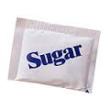How many packets of sugar do you put in your coffee or tea? Two? Four? Maybe even six? Well I’m guessing you don’t open up 20 of those little sugar packets and pour them all into your 16 oz. cup of tea. That sounds like a lot right? 20 packets of sugar is way too much to consume in one drink, right? It’s common sense, isn’t it?
Well, apparently not for the food industry. Sugar makes things taste good, and when things taste good, people buy them. But maybe you wouldn’t buy them if you knew just how much sugar you are drinking when you consume one can of soda.
Want to know how many sugar packets the food industry added to that energy drink you bought at the gas station? Here’s how you can figure that out:
One sugar packet contains 2 grams of sugar. On the nutrition facts panel of your drink, look under the total carbohydrates for sugar, and it will tell you how many grams of sugar are in the drink. If this is your cup of plain tea that you added 4 packets of sugar to, then there are 8 grams of sugar in your drink. If you chose a bottle of lipton raspberry iced tea instead, your label will tell you that the bottle contains 40 grams of sugar. If each packet of sugar contains 2 grams, then the industry that sold you that bottle of iced tea added 20 packets of sugar to your drink for you.
And that’s not even the worst. A bottle of Sobe energy drink contains 34 packets of sugar. One can of pepsi or any regular soda contains about 21 packets of sugar. Even a 20 oz. bottle of vitamin water (sounds healthy right?) contains 16 packets of sugar.
Would you add 34 packets of sugar to your beverage of choice? Would you even add 16? Next time you’re at a coffee shop, count out 34 of those little packets of sugar and hold them in your hands. You probably won’t even be able to hold them all at once. Would you really consume that much sugar at once? As a consumer in this society, chances are that you have on multiple occasions. But now you know, and now you can avoid these ridiculously sugary beverages.
Try buying unsweetened iced tea and adding your own, reasonable amount of sugar. Or switch to diet or sugar free beverages that use artificial sweeteners. These artificial sweeteners are generally 20x as sweet as regular sugar, so you need only a tiny drop to produce a similarly sweet taste. But wait, don’t artificial sweeteners cause cancer? Some scientists have found that rats developed cancer when they fed them the equivalent of 2300 cans of diet soda a day. That’s not enough evidence to suggest that having a couple cans of diet soda a day will cause cancer in humans, not even close. Of course, your best bet would be to stick with water and unsweetened iced tea, but otherwise, I would say the artificially sweetened drinks pose less risk on your health. Chances are, you will become diabetic from consuming excess regular soda before you develop cancer from consuming excess diet soda.
